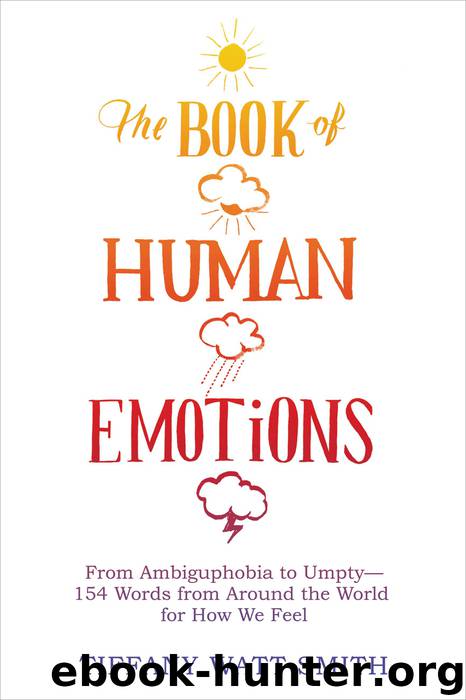The Book of Human Emotions by Tiffany Watt Smith

Author:Tiffany Watt Smith
Language: eng
Format: epub
Tags: Language Arts & Disciplines / Linguistics / General, Psychology / Emotions, Reference / Word Lists
Publisher: Little, Brown and Company
Published: 2016-06-06T16:00:00+00:00
JEALOUSY
You have to trust. That’s what you tell yourself. When you see the e-mail hurriedly closed down and a bright smile—is it too bright?—on the face. Or the door quietly closed on a phone call. Or a mumbled explanation for returning late and crumpled. You have to trust. But it catches you in a daydream. The flirtation, the kiss. The plans. Shake the thoughts from your head. Breathe. Stare at the bag (don’t open it!). Stare at the coat (don’t search it!).
We may dedicate a lifetime to avoiding the effects of jealousy. It is mostly a private agony, doing its work furtively in the dark. We know that suspicious accusations will make us look feeble and petty. They could cause problems that don’t exist. So jealousy makes itself known in other ways, in little spites, muttered grievances. A slammed-down dinner plate. A refusal to have sex. It is even a motive for murder. His voice scratchy on the record player, John Lennon sings of losing control, of not meaning to hurt anyone: he’s just a jealous guy.
Jealousy is the suspicion of a rival, a DREAD of being supplanted. In contrast to ENVY, which is defined as wanting a thing one does not have, jealousy involves the fear of losing a person or their affections to someone else. It is triangular: me (the victim), you (the traitor) and the other (the thief). Such treacheries are all the more painful for the feeling of having been discarded (see: HUMILIATION). It is this threat that makes jealousy so inflammatory—and intimacy such a risk.
We are heirs to a strange and conflicted history of jealousy, one that has almost entirely been shaped by gender. While a jealous woman has been historically regarded as meagre and quibbling (she is never the heroine, only ever the bitter rival to true love), a jealous man belongs to a more honorable tradition. In the courtly romances of medieval Europe, the idea of love became inseparable from the yearning felt for an unobtainable lover—unobtainable usually because he or she was married. The lover’s jealousy inflamed desire, and was its true signatory: “He who is not jealous can not love,” wrote the twelfth-century author Andreas Capellanus in The Art of Courtly Love, continuing, “jealousy, and therefore love, are increased when one suspects his beloved.” But jealousy did not only thrive in the hearts of interlopers. Husbands could feel it too. Writers of medical treatises in this period described jealousy as the ANGER felt when one’s honor had been compromised. It heated the body and energized it for the necessary violent retaliation (they believed men, who were thought to be already hotter than cold, damp women, would experience more powerful surges of jealous rage). In Shakespeare’s Othello (1603/4), its tragic hero absorbs these complex attitudes to jealousy: Othello, the original “jealous guy,” is at once hero and victim, an archetype of love’s brutal possessiveness, and a man turned to “poison,” his soul eaten away by the “green-eyed monster.” Of course, the real
Download
This site does not store any files on its server. We only index and link to content provided by other sites. Please contact the content providers to delete copyright contents if any and email us, we'll remove relevant links or contents immediately.
| Slang & Idioms | Vocabulary |
| Word Lists |
Cecilia; Or, Memoirs of an Heiress — Volume 1 by Fanny Burney(31333)
Cecilia; Or, Memoirs of an Heiress — Volume 3 by Fanny Burney(30934)
Cecilia; Or, Memoirs of an Heiress — Volume 2 by Fanny Burney(30889)
The Lost Art of Listening by Michael P. Nichols(6474)
We Need to Talk by Celeste Headlee(4870)
Asking the Right Questions: A Guide to Critical Thinking by M. Neil Browne & Stuart M. Keeley(4576)
On Writing A Memoir of the Craft by Stephen King(4214)
Dialogue by Robert McKee(3582)
I Have Something to Say: Mastering the Art of Public Speaking in an Age of Disconnection by John Bowe(3516)
Pre-Suasion: A Revolutionary Way to Influence and Persuade by Robert Cialdini(3414)
Elements of Style 2017 by Richard De A'Morelli(2945)
The Book of Human Emotions by Tiffany Watt Smith(2771)
Good Humor, Bad Taste: A Sociology of the Joke by Kuipers Giselinde(2557)
Name Book, The: Over 10,000 Names--Their Meanings, Origins, and Spiritual Significance by Astoria Dorothy(2491)
Fluent Forever: How to Learn Any Language Fast and Never Forget It by Gabriel Wyner(2446)
The Grammaring Guide to English Grammar with Exercises by Péter Simon(2394)
Why I Write by George Orwell(2359)
The Art Of Deception by Kevin Mitnick(2298)
Don't Sleep, There Are Snakes by Daniel L. Everett(2217)
